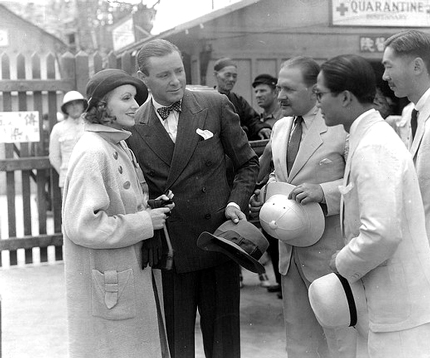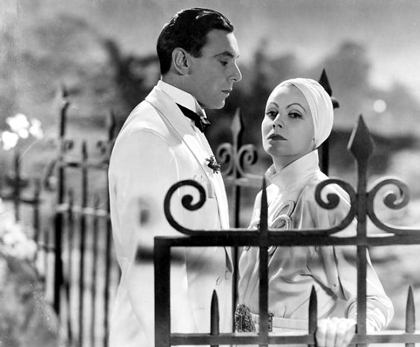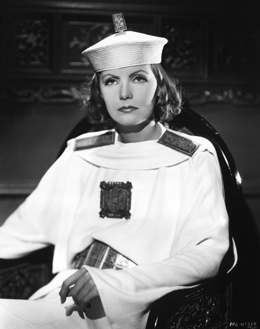
 |
|
|
|
Usually not ranked in the top tier of Greta Garbo pictures, The Painted Veil shows the consummate actress breathing life into a story that even in 1934 must have seemed pretty stale. In just the past two years, audiences had seen movies fancy (Arrowsmith) and humble (Mandalay) involve the situation of a doctor husband, wife in tow, in a tropical outpost to fight deadly diseases. The sordid details of W. Somerset Maugham's original 1925 novel might have been a tough sell even in the Pre-Code era. Contemporary reviewers liked to snipe at Garbo, perhaps because she was so removed from the scuffle of the movie business, or because her talent was so great that critics were no longer needed. The Painted Veil has plenty of dialogue, but really functions like a silent movie. With a few exceptions, the drama is developed and played out on Garbo's face as she reacts to those around her and considers her own questionable choices. Her acting indeed functions on a different level than that of most film stars. 
Viennese Katrin Koerber (Garbo) watches as her younger sister Olga (Cecilia Parker) marries and leaves on her honeymoon. Katrin hass turned down matrimonial opportunities because she wants something more from life. She gets it when a colleague of her father's, bacteriologist Walter Fane (Herbert Marshall) impulsively proposes that she marry him -- he's returning to Hong Kong in just a couple of days. In the Crown Colony Katrin finds Walter absorbed in his work. Bored and frustrated, she begins an affair with customs official Jack Townsend (George Brent). When Walter finds out, he offers to give Katrin a divorce only if Jack will divorce his wife (Katherine Alexander) and marry her. Because she finally feels that she's in love, Katrin thinks this is the way out -- but events don't cooperate. The secret to appreciating The Painted Veil may be in understanding how much story exposition is made unnecessary by just a couple of glances from Garbo. In the Maugham book Katrin (Kitty) sees Walter's proposal, "Will you marry me?" as an escape from her stuffy home life. Her answer is "I suppose so." The thought of marrying Walter had never entered her mind. The film jumps directly from Katrin mumbling, "I want to think about it over tea", to the married couple arriving in Hong Kong. It's the look on Katrin's face that tells the tale. 1 The Garbo Mystique may simply have arisen from the fact that her characters' thoughts and feelings aren't communicated in dialogue. We don't know how committed to Walter Kristen might be. Viewers still thinking of Garbo's masculine performance in Queen Christina can read whatever they wish into the big kiss on the lips -- make that two big kisses on the lips -- that Kristen gives to her little sister in the film's first scene. Once in Hong Kong the film becomes yet another tale of sultry Anglo love in an exotic location. Walter and Katrin live in a house every bit as comfy as anything in Europe, with servants that insulate them from the picturesque but irrelevant 'teeming masses' outside. Dr. Fane's Chinese assistants (who include Keye Luke) strive to behave as English as possible. The only hint of what may have been the novel's insight into the colonial mindset comes with Forrester Harvey's Waddington, a deputy district commissioner. He's a Cockney chatterbox, solicitous of Katrin's company and hopelessly vulgar. Even she loses patience with him. It's of course Garbo's show, as we're watching her at all times. Katrin goes through several trials of frustration and disillusion. When she has little choice but accompany Walter to a region struck by cholera, she's terrified that it's his plan for her to get sick and die. Maugham's book shows "Kitty" slowly finding new values, when a Mother Superior allows her to help work in the hospital, initially only in a limited way. The MGM adaptation naturally pulls off an instant transformation in which Katrin has suddenly become Florence Nightingale, shielding crying Chinese children from sickness and fear. Garbo is so good that this hoary development never seems tacky. 
George Brent and to a lesser extent Herbert Marshall made a career supporting acting divas; both were fine actors but are so subdued here that we wish Katrin would run into a real man and take off with him. Marshall's researcher simply ignores Katrin whenever there's work to be done; even when he catches her being unfaithful his rage is subdued. The intent is surely to put things on a civilized level -- these are supposed to be good people. We're impressed by the fact that Garbo's Katrin is apologetic about her adultery but refuses to wail or beg: as far as she's concerned what happened was inevitable considering Walter's attitude. Brent was the king of vehicles starring the likes of Kay Francis, Ruth Chatterton, Bette Davis, and any top female star who needs a leading man who won't upstage her. He's also a very good actor. It's therefore fairly sad that Code morality requires that Jack's function as both a heel (seducing Katrin) and a hypocrite (my career can't afford a scandal!) be minimized. This hurts the drama to some degree -- the marvelously insightful Katrin was taken in by this clod, and still wants him? Luckily, Garbo's largely non-verbal performance smoothes out all of this. As in most '30s MGM pix, everyone is just so damn noble. Without Garbo raising the quality level, I'm not sure what we'd have. Also on the iffy side is MGM's handling of the Asian setting. Hong Kong and the interior 'plague towns' are represented by some impressive sets. We get Brent and Garbo pushed and pulled along by panicked crowds of peasants. Some Chinese men try to grab at Greta, which of course restates the prejudiced idea that Asian men are sex-mad over White Women. We definitely get the idea that Walter's effort to save lives is a contract between him and a greater morality, with the actual suffering Chinese somehow left out of the equation. Walter and a Chinese General (Warner Oland!) try to reason with the mob, rather foolishly. The film creates some really attractive images that juxtapose Garbo against faux-Chinese artwork, photograph her through filmy nets, etc. William Daniels' lighting was as important a consideration as anything in the script. He includes soft-focus close-ups of Garbo that for all real purposes are simply out of focus. Instead of wondering what's up, we buy into the notion that Garbo is a romantic ideal, a phantom. 
The weakest aspect of the film was probably a big selling point in 1934. A "Chinese Fantasy" outdoor theatrical presentation is meant to be a local festival tradition, but looks like it comes straight from the MGM art department, more specifically from designers who either want to be Mitchell Leisen or are waiting for the big Minnelli musical projects to drop from heaven. Jack and Kristen just happen upon an incredible floorshow pageant staged on a swooping set of stairs, with dancers wearing what look like chrome-plated Chinese dragon and demon costumes. Lots of wiggly swords, long fingernails, you get the drill. I could be wrong but it's all seen in cutaways -- the Chinese Fantasy almost seems like something shot for a different movie, and that somehow got put here. We wouldn't complain, but the spectacle doesn't seem to have any bearing on the lovers' relationship -- it isn't about the joy of illicit love or finding one's heart in Old Cathay. The 'conceiver' of the Chinese Fantasy was Stowitts, a former ballet partner of Anna Pavlova whose cinematic claim to fame is his role as a horned faun-like character in the Hell sequence in Rex Ingram's impressive silent horror film The Magician ... which is yet another story by W. Somerset Maugham. In the one still constantly reprinted from that show Stowitts kneels before a tree with his arm extended toward the frightened heroine... he's all but nude. Chester Hale staged the Fantasy. Adrian of course designed Garbo's fashions -- she appears in one stunning dress after another. The exception is a white thing that looks like a military uniform, topped by a funny hat with an emblem sticking out of the crown. Katrin looks like she should be tearing tickets at Grauman's Chinese, or worse, like a teapot. The Painted Veil gives us a positive message about nuns, social service and the healing power of healthy, Code-Approved marital fidelity. Maugham's original naturalistic ending was dropped in favor of letting 'em leave the theaters happy. It's all about Garbo. Although this isn't one of her timeless classics it's still a solid drama. 2 
The Warner Archive Collection DVD-R of The Painted Veil looks good. The print has good density -- the style is a sort of hazy tropical look, perhaps aping what Von Sternberg was doing over at Paramount,. Many small scratches and bits of dirt crop up, making us wonder how fantastic this picture could look on HD with a careful cleanup. I guess if there ever were a Garbo HD series, they'd probably start with Ninotchka, and then maybe Camille. What would be the order of popular/important/significant Garbo titles, and where on it would we find The Painted Veil?
On a scale of Excellent, Good, Fair, and Poor,
The Painted Veil rates:
Footnote:
1. The IMDB lists a group of characters whose scenes were deleted, that may have been part of an extended Vienna sequence. Either that, or they were dropped because of a casting problem/change of direction. It looks as if Beulah Bondi was originally to play Katrin's mother, and Walter Brennan might have been cast as her father. 2. MGM remade The Painted Veil in 1957 as The Seventh Sin. The romantic triangle was Eleanor Parker / Bill Travers / Jean-Pierre Aumont and the director Ronald Neame. In 2006 saw an elaborate remake directed by John Curran, starring Naomi Watts, Edward Norton and Liev Schrieber. I don't remember it being terrific but I should probably see it again.
And how about that Herbert Marshall / W. Somerset Maugham connection? He appears in the Maugham adaptations The Letter (1929), The Letter (1940), The Moon and Sixpence and The Razor's Edge. In the 2nd film Marshall's character is a thinly disguised Maugham figure and in the third his character is W. Somerset Maugham.
Reviews on the Savant main site have additional credits information and are often updated and annotated with reader input and graphics. Also, don't forget the 2011 Savant Wish List. T'was Ever Thus.
Review Staff | About DVD Talk | Newsletter Subscribe | Join DVD Talk Forum |
| ||||||||||||||||||